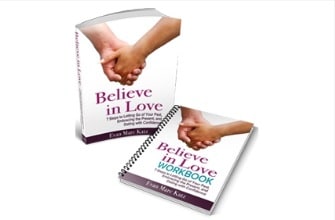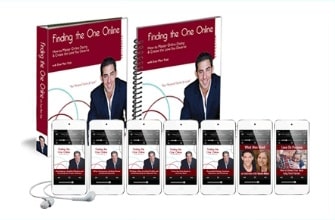What Happens When You Don’t Trust Your Judgment in Relationships?

- Dating, What You May Be Doing Wrong
Wouldn’t it be great if people were like computers? Instead of acting on things like “feelings” and “emotions,” we’d work off facts and empirical evidence, so that we’d never be fooled by the same racket twice. Sure, no one would be able to cry at chick flicks or sense when something’s wrong when you come home from work, but who cares? The day you emulate your laptop will be the final day you look across the dinner table at your boyfriend and ask yourself, “What the hell am I doing with this guy?”
Regrets? I’ve had a few. And after each bad relationship, I find myself retrospectively scratching my head, wondering how I could have been so blind. Ever ask your friends, “Now that we broke up, what did you really think about him?” Sure, you have. Upon which you learned that everyone unanimously felt he was a jerk since Day 1. What are friends for, if not to lie to you by lending unconditional support?
So if the rest of the world can see that someone is toxic, why do we stay? How do we end up with people who turn others off, but turn us on? I think it’s those damn human feelings getting in the way again. Even a total jerk can be expected to be a nice guy 80% of the time. And that 80% is all the positive reinforcement you need to stick around for too long with the wrong guy. If you were to be an impartial third-party judge of your own life, you might act differently. But it’s a lot harder to leave your own neglectful boyfriend than it is to tell your girlfriend to dump hers.
It’s simple to put labels on a guy to justify why he should be dumped— he’s neglectful, he’s abusive, he’s selfish, he’s gay, blahblahblah. What’s far more interesting is when you find yourself wholly invested in someone who defies any of these “bad” descriptions. In fact, you’re pretty sure you’re dating a good person. He was generous when courting you, he was respectful when he met your parents, and he gets along really well with your friends. You couldn’t have seen his downside when you first got together. But since he lost his job, you’ve discovered he has a really short temper. Plus, he hasn’t been too aggressive in finding work. In fact, he said that he’s contemplating a new career, although he doesn’t know what that will be quite yet.
Revelations like this present a real problem. People fall hard and fast for each other, which is wonderful and normal. No one should begrudge anyone’s puppy love. But as any parent will tell their teens, puppy love is evanescent. True love takes endurance. Which is why there’s no point in beating yourself up about not trusting your judgment. It doesn’t do you any good.
By the same token, I’m not saying that you should always trust your judgment. We’re humans. We make mistakes. However, like lab rats who get shocked when they go for the wrong cheese, we have the capacity to learn from them. And if you’re going out with the same narcissistic guy or the same alcoholic guy or the same emotionally unavailable guy over and over and over again, THAT’s where you need to beat up on yourself. The one thing you can trust is that you’ve been down this path before and you know how it ends….
It may make perfect sense to be gun-shy following a string of mistakes, but the present is not the past, and you are not the same as you were during your last relationship. Because relationships are inherently exploratory, judgment is best rendered later, when you have more facts. And if, after all of this, you still can’t trust your judgment, try to trust your gut — the part that says that you’re not excited by him, the part that says that something’s a little off. You’ll never know right off the bat if the guy who’s close with his family is a spineless mama’s boy, so give him a fair shake until he doesn’t deserve one. Just don’t expect your friends to tell you the truth until it’s over.
LINDA HOLMES RESPONDS:
One of the things people asked me when they found out I was working on our book was an obvious, but intriguingly weird, question: Why would anybody listen to a single person’s thoughts about relationships? This was a question particularly directed to me by a couple of smug married people I met casually, who wouldn’t read a book like Why You’re Still Single anyway, didn’t know me, and believed that they were far more difficult to read than they actually were.
The thesis behind this question is that a single person, by definition, knows nothing about relationships, because if she did, she wouldn’t be single. It makes sense on the surface, right? But think about it this way: if success is defined as the ability to have a long-term relationship that doesn’t end for one reason or another, then every person starts every new relationship batting 0-for-whatever. All your relationships have ended. You haven’t made it work yet. Ergo, you know nothing.
This kind of thinking, if you embrace it, will sink you. You are asking yourself to enter your next relationship assuming you don’t know anything. In my experience, it’s not the things you genuinely don’t know that mess you up; it’s the things you won’t admit you know. It’s the things that are sitting right there ready to be noticed if you’re willing to pay attention to what’s already happened in your own life.
You’ve learned, for instance, that when people stop calling and they make you do all the work, that’s a bad sign. You’ve learned that picking at the scab of an old argument has never, ever, in the history of your relationships, made anything better. You’ve learned that nobody interesting is attracted to you when you act helpless. You’ve learned that showing off how damaged and needy you are will only attract drama.
So you have two choices. You can go on the theory that you don’t know anything. You’re single, after all. What do you know? Or you can listen to your own judgment and your own experience, and you can admit that you have, in whatever painful way, probably learned a lot.
Of course, the problem is the fact that not all your instincts should be obeyed. Lots of things — fear, overthinking, past hurts, external pressure — can throw them off. It’s not that you should act on every impulse that you have on the assumption that your accumulated wisdom will steer your impulses every time. The trick, I think, is how to tell the difference between an impulse and an instinct. I’d love to tell you that there’s a rule of thumb that will identify the difference between a gut feeling you must not ignore and one that you must overcome. From time to time, you’re going to guess wrong; there’s no way around it.
Consider the classic problem of what to take personally. Your boyfriend is busy at work, and he stops calling. On the one hand, your experience will tell you that signals that come in the form of people pulling back from you should not be ignored, and that reading the room is important. On the other hand, it may also tell you that you have some tendency to take things to heart that should not be taken as such. What do you do? It would be great if there were a bulletproof way to be right, but you’re going to have to draw a line. In this case, it’s a line that marks how much dropping out is too much before you freak out. The fact that you freaked out unnecessarily last time over not being called for two days doesn’t mean that you should let it go by if you don’t get a call for two weeks. In the same way, the fact that you feel like you missed the signs last time because your boyfriend avoided you for three weeks doesn’t mean that the first time he asks for a night alone, you should tell him you get it, tell him you understand, wish him well, and rush right over to pick up the DVD you left at his apartment so that the two of you never have to speak again.
What you have to do is read the signs — all the signs, good and bad, and do the best you can. You know things, and it’s when you can feel yourself straining to ignore one of those things you know that you’re going to get yourself in trouble. What do you, a single person, know about relationships? Probably more than you think.
This passage was an “additional chapter” not published in Why You’re Still Single – Things Your Friends Would Tell You If You Promised Not to Get Mad Copyright © 2006 Evan Marc Katz and Linda Holmes










Comments